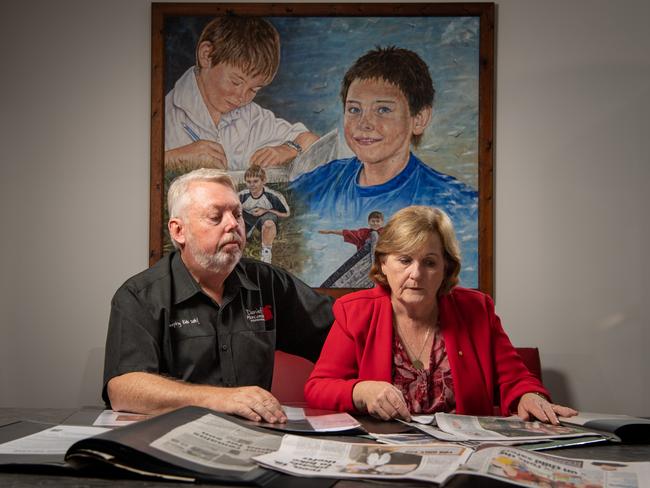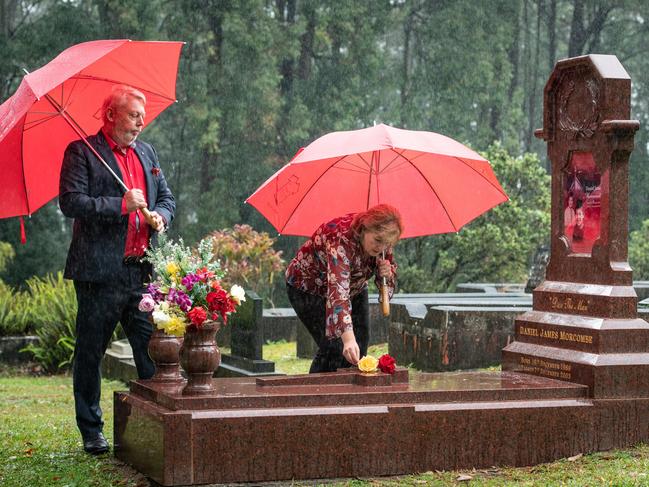South Australian sex offenders free to roam streets, national register needed
These are some of the faces of evil who are living in our neighbourhoods, as the state government keeps parents in the dark about paedophiles. SEE THE LIST AND THEIR CRIMES
True Crime
Don't miss out on the headlines from True Crime. Followed categories will be added to My News.
Sex monsters are free to prowl neighbourhoods as the State Government keeps parents in the dark about where paedophiles live.
Neighbours must be told if there is a dangerous dog in a nearby yard, yet human predators are using privacy protections to hide in plain sight.
The Advertiser is calling on all state and territory governments to sign up to a national register of Australia’s 20,000 convicted sex offenders.
Reports to the Australian Centre to Counter Child Exploitation have soared 50 per cent, to 21,000, in the past year.
The nation’s Child Safety departments substantiated 4714 cases of child sexual abuse last year, when nearly 27,000 Australians were sexually assaulted – an all-time record.
Bruce Morcombe, the father whose 13-year-old son Daniel was abducted and murdered by a paedophile on the Sunshine Coast in 2003, is demanding a “Daniel’s Law” to alert the public to sex offenders living nearby.
“It would have made a difference in terms of educating Daniel and our other boys that predators did live in our neighbourhood,” Mr Morcombe said.

“It also would make a difference in terms of a deterrent; if the worst of the worst know they’re on a publicly accessible register, they’re a lot less likely to commit a premeditated offence.
“At the moment we are too focused on protecting past offenders, and not enough work is being done to protect kids. Kids come first.”
Mr Morcombe opposed vigilante attacks on offenders, but felt parents had a right to access photos of paedophiles living nearby.
He said sex offenders should not be exposed if it would reveal the identity of their victims.
The Australian Federal Police, which arrested 161 Australians on child sex offence charges last financial year, refused to comment on the need for a national register.
“There is a lot of child abuse going on in the community today, and a lot of it is facilitated through technology,” AFP forensics co-ordinator Nathan Green said.
“Statistically, everybody would know somebody. There’s no group that is immune for either offenders or victims. There’s no socio-economic group, there’s no defining characteristic, it’s every walk of life.”
Federal Home Affairs Minister Peter Dutton handed the states and territories $7.8m in last year’s federal budget to set up a National Public Register of Sex Offenders, with names, aliases and photos of paedophiles, along with their general location and the nature of their crimes.
More than a year later, WA is the only state that gives the public access to its police register of sex offenders.
Anyone can apply to see photos of convicted sex offenders living in their suburb, or adjoining suburbs – although names and addresses are kept secret to prevent vigilante attacks. Single parents can ask police to check on a new partner, while parents can seek background checks on babysitters.
Mr Dutton said the Federal Government was “at war with sex offenders”.
“It’s time that other state and territory leaders show where they stand,” he said.
“A national system such as this would have a very strong deterrent effect on offenders and ensure that parents are not in the dark about whether a registered sex offender is living in their community.’’
Mr Morcombe said he was “greatly disappointed” that states were denying parents and children the right to know if predators were living nearby.
“Parents and carers need the ability to check the number of offenders against kids in a geographical area – perhaps the kids’ school or their grandma’s house,” he said.
“Maybe their daughter is a single mum who’s going out with someone new, or their elderly parents are looking at putting on a boarder.
“It is a simple test to see if that person has a history of offending against children.”
Mr Morcombe said the public was alerted to dangerous dogs through signs on gates, and to crocodiles in creeks. “That does not mean you’re going to slit the throat of every crocodile you see sunbaking on a sandbank,” he said. “It’s a warning sign to be aware.”

Law Society of Australia president Pauline Wright said any register must be accurate.
“(It must not) lead to the potential for vigilante attacks, mistaken identity, or the risk of offenders going into hiding, which would make it harder to supervise them when released,” she said.
She warned that exposing predators might inadvertently reveal the identities of victims.
“Publication may impact a victim’s right to privacy and compound the already significant trauma, embarrassment, and distress suffered,” she said.
More than 1800 people have signed a petition by federal MP Julian Simmonds to establish the national register.
“It’s not a call to vigilantism because it doesn’t show exactly where they’re living,” Mr Simmonds said.
“Parents deserve to know information about people who have been convicted of child exploitation and the most hideous crimes imaginable against children.”
A State Government spokesman said convicted child sex offenders were listed on a police register for life. Access to the register was restricted, under the child Sex Offenders Registration Act.
He said it was an offence to disclose information about an offender, unless the Police Commissioner released details when an adult offender failed to report to police or went missing.
HOW WESTERN AUSTRALIA’S PUBLIC REGISTER WORKS
AUSTRALIA’s only public register of paedophiles has been checked by 677,000 people since it was set up in Western Australia in 2014.
The WA Community Protection website alerts people to the state’s most dangerous and high risk sexual offenders.
Parents and guardians can ask WA Police to check the criminal history of any person who has regular unsupervised contact with their child.
Single parents can check if someone they’re dating has a criminal record for sex offences.
Divorced parents can even ask police to tell them if their ex-partner’s new boyfriend or girlfriend has a history of child abuse.
Parents and guardians just need to fill in an online form asking police to check the name of anyone who has regular contact with their children.
Police send back a “yes” or “no” response, but cannot provide details of the conviction.
Only adult offenders are listed on the Community Protection website.
It shows photos and personal details of all offenders who have gone missing, failed to comply with their reporting obligations, or given false information to police.
Members of the public can type in their driver’s licence details to check for photos of offenders living in their suburb, and all adjoining suburbs, although names and addresses are not released.
The disclosure scheme also lets a parent or guardian of a child inquire about a specific person who has regular contact with their child.
All applications are processed online, and anyone who uses the information to distribute the photos or “engage in any conduct that will create, promote or increase animosity toward or harassment’’ of the offender risks 10 years in jail.
Applicants cannot search for offender photographs in other localities.
The executive manager of the Sex Offender Registry, Martyn Clancy-Lowe, yesterday said 677,000 people had accessed the register since it was established.
He said there had only been a handful of reports of harassment or stalking of offenders, and action had been taken against anyone who posted photos on social media or distributed posters.
WA Police Minister Michelle Roberts said the register was “the most valuable tool used by police forces around Australia to monitor child sex offenders’’.
“I want to reiterate to the public, and parents in particular, that most child sex offenders are known to victims,’’ she said.
“So parents must always be vigilant in protecting their children.’’
Originally published as South Australian sex offenders free to roam streets, national register needed

